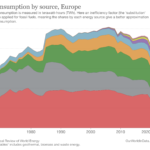Why higher taxes on meat and milk aren’t a good idea
Johannes Eber – Good morning Europe blog
There is an ongoing debate (in german) in Germany whether some food should become more expensive.
The new German Minister of Agriculture, Cem Özdemir, had declared war on junk prices. Greenpeace supports the push against “dumping prices” for food, calling for a higher value-added tax (VAT) on meat and dairy products.
A good idea?
First, a good idea for what? What problems should a higher tax solve?
Low prices on meat and dairy are often said to be the result of these problems: Disregarding animal welfare, driving farms to ruin, and polluting the climate.
“The consumption of meat and dairy products in Germany causes environmental and climate damage amounting to around 6 billion euros a year. The real costs are not reflected in the price,” says the Greenpeace expert Matthias Lambrecht.
People in Germany pay a reduced VAT rate of 7 per cent (here you’ll find the different VAT rates across Europe) for meat and dairy products.
Would an increase (for example, a switch from the reduced 7 per cent to the regular VAT of 19 per cent) help to solve the problem? What would happen as a result of such a tax increase?
First of all, the final prices for consumers would rise.
As a result, the demand for meat would decrease. How strong this decline would be would depend on the preferences of the customers for these products. In economics, this is called price elasticity of demand (more here).
This drop in demand would neither improve the quality of the products nor help the farmers. However, if the lower demand is followed by less production, this could be beneficial for the climate.
There may be a reaction from producers to this price increase and decrease in demand.
If the farmers managed to cut costs, prices would then fall again, and demand would increase. Assuming prices and demand reach the former level, then the climate would not be helped, nor the animal’s welfare, and farmers would reach at most the previous level of income. Nothing will then change for consumers nor animals. Unless the cost reduction is accompanied by a loss of quality and lower animal standards. Then consumers and animals would be worse off.
However you turn it around, a tax increase seems to be not suitable to solve the problems mentioned above.
Then what should be done?
It is a good tradition in economic policy to achieve one goal by one instrument.
Applying this rule here can lead to the following recommendations:
- Raise standards of animal welfare and review these standards more effectively.
- Make climate costs part of the production costs. This can be done by making livestock farming part of the EU Emissions Trading Scheme, short ETS (here is how the ETS works). Animal owners then have to buy emission certificates, which makes the production costs more expensive, but also fairer.
And as far as the farmers’ incomes are concerned: if competition is regulated fairly, for example, by carefully monitoring compliance with animal welfare rules, fierce competition is OK. Consumers then benefit from farmers who attract their customers without doing this at the expense of the climate and by following the rules of animal welfare standards.
Tackling problems where they arise is not just good advice from economics. If you do so prices are the result of all these efforts, not the starting point as an increase of the tax rate would be.
Author Profile

-
Founder of the "Good morning Europe blog" and Pixel economist
Guest author for European Liberals for Reform
Johannes' articles are originally written for the “Good morning Europe” blog (www.goodmorningeurope.org) and the Pixel economist (https://thepixeleconomist.substack.com).
We were given permission to publish his articles on the European Liberals for Reform blog.
Latest entries
Post Disclaimer
The opinions expressed by the author of this post do not necessarily represent the opinions and policies of ELfR.




